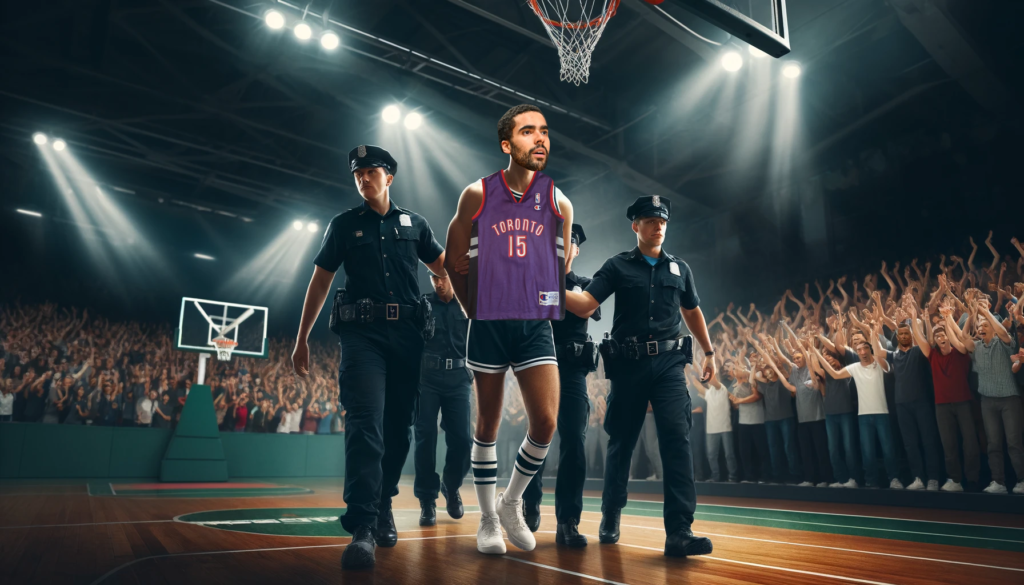In this week’s GME3, an unfortunate new development for (now former) Raptors’ center Jontay Porter, Google expands their ban on hosting news in California, and Truth Social continues to shoot for the moon but hasn’t quite figured out how to land among the stars. Read on for the full stories!
Gambling
Can’t Spell NBA Without BAN
In a new development from the story we covered earlier this month, Jontay Porter, center for the Toronto Raptors, has been given a lifetime ban by the NBA for violating the league’s gambling rules. In its official statement, the league explained that: “A league investigation found that Porter violated league rules by disclosing, confidential information to sports bettors, limiting his own participation in one or more games for betting purposes, and betting on NBA games.”
This comes as little surprise, as a report from Action Network revealed on Tuesday that Porter owned and operated a Colorado-based account with the popular sports betting app FanDuel that wagered millions of dollars across over 1000 bets between 2021 and 2023. While Porter was a member of three different NBA G League teams during this time, it’s reported that the Fan Duel account activity stopped entirely a few weeks before signing his contract with the Toronto Raptors.
The account was only discovered when Colorado gaming regulators requested sportsbooks that operate in the state to report any accounts that Porter may have operated. They were specifically searching for bets he may have placed on NBA games, as the league bans wagers of any kind by its players on NBA games, or any affiliated properties, including the G League and the WNBA. However, no bets were found to be placed directly on basketball – professional or otherwise – during this period. Despite this, it seems the NBA has collected enough evidence of interference to warrant a lifetime ban for the young player.
Before the ban was announced, Raptors president Masai Ujiri seemed to be caught off-guard by the events:
“First of all you don’t want this for the kid, don’t want this for the team, and don’t want this for the league. That’s for sure. My first reaction is obviously surprise because none of us, I don’t think anybody saw anything like this coming. You prepare as much for any kind of situations in the NBA, but definitely didn’t see this coming. But we act in accordance of what the NBA rules and regulations are of dealing with things like this and we move forward with it.”
Unfortunate for Porter, but let this be a lesson on how seriously sports leagues take their gambling policies. If you’re curious about the policies in place in the major sports leagues, Zack Pearlstein wrote a great article on the topic that you can find HERE.
Media
Google Breaks The News
Tech companies continue to land themselves in hot water over the news, but this time outside of Canada. Earlier this week, The News/Media Alliance, a journalism trade organization and advocacy group that operates across Canada and the US, requested that government officials investigate Google after the tech giant said it would limit links to California news outlets in its search results. The Alliance stated that the move appears to be “either coercive or retaliatory, driven by Google’s opposition to a pending legislative measure in Sacramento.”
The legislation in question, the California Journalism Preservation Act (CJPA) would require tech companies, like Google, to pay news publishers when advertising is being sold alongside their content. As such, the Alliance is requesting that the government investigate whether Google’s choice to limit access to news would violate any laws. Google has replied, calling the claims “baseless,” while also stating that the CJPA is not the correct approach to supporting news outlets.
What will it look like if Google stops sharing news from California? Well, luckily for us, as a Canadian company, we don’t have to guess! Meta has been blocking news in Canada since August of 2023 for a very similar reason – to avoid paying fees to media companies when publishing their work.
According to the CBC (which may or may not be biased about the public availability of its own content), this has led to “profound and disturbing changes” in how Canadians consume and interact with media, especially when it comes to politics. One study found that engagement for what it categorized as “unreliable” sources rose to 6.9% in Canada in the 90 days after the ban, compared to only 2.2% in the 90 days before. Other factors have contributed to this, the study concluded, including AI-generated news sites publishing false claims, and growing numbers of faked audio, images and videos.
The quality of Canada’s media landscape has definitely taken a hit due to Meta’s news ban. This is especially concerning as Canada heads towards a federal election in 2025 and misinformation runs rampant. Our friends to the south are also heading into election season this year, so any disruption to the availability of reliable information could have a serious effect.
Entertainment
New Revenue Stream(ing)?
Finally, another curveball has been thrown by Trump-owned social media platform Truth Social. Shares in the company took another significant dip earlier this week when it was announced that Truth Social would be branching out into the streaming business in the near future.
The stock fell a cumulative 32% on Monday and Tuesday of this week, before rebounding slightly to $29.75 per share as of the writing of this article. That’s a far cry away from the stock’s record valuation of $66.22 per share not even a month ago.
The decline is likely due to a combination of factors. Chief among them is that streaming is a demanding, costly market in which even monolithic companies like Disney struggle to turn a profit. And, as Truth Social is positioned as a platform that enshrines users’ right to free speech, we may see it struggle to bring in ad revenue. As we’ve seen with X, where hate speech and conspiracy theories have been running rampant recently, advertisers aren’t thrilled about attaching their brand to that type of messaging.
GME Law is Jack Tadman, Zack Pearlstein, Lindsay Anderson, Daniel Trujillo, and Will Sarwer-Foner Androsoff. Jack’s practice has focused exclusively on gaming law since he was an articling student in 2010, acting for the usual players in the gaming and quasi-gaming space. Zack joined Jack in September 2022. In addition to collaborating with Jack, and with a keen interest in privacy law, Zack brings a practice focused on issues unique to social media, influencer marketing, and video gaming. Lindsay is the most recent addition to the team, bringing her experience as a negotiator and contracts attorney, specializing in commercial technology, SaaS services, and data privacy.
At our firm, we are enthusiastic about aiding players in the gaming space, including sports leagues, media companies, advertisers, and more. Our specialized knowledge in these industries allows us to provide tailored solutions to our clients’ unique legal needs. Reach out to us HERE or contact Jack directly at jack@gmelawyers.com if you want to learn more!
Check out some of our previous editions of the GME3 HERE and HERE, and be sure to follow us on LinkedIn to be notified of new posts, keep up to date with industry news, and more!




